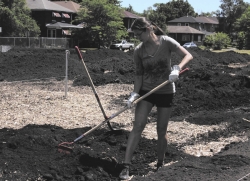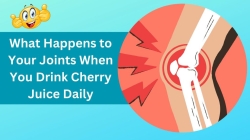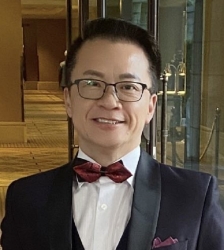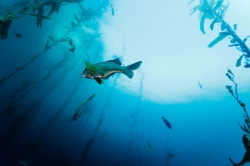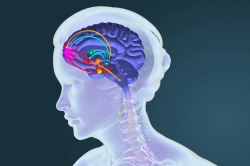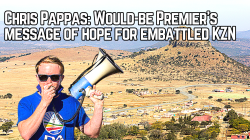People who take weight loss drugs should not neglect diet and exercise. Here’s what to know…
Read More
Weight Loss Drugs Should Be Taken With Diet and Exercise
NIRPC hears about local, healthy food from NWI Food Council
More than 30 of Northwest Indiana’s local government leaders learned about healthy local food and railroads Thursday, as Northwestern Indiana Regional Planning Commission members heard from leaders of the Northwest Indiana Food Council and a Norfolk Southern representative.
Incorporated in 2018, six years after a NIRPC-funded study, the Northwest Indiana Food Council aims to end food insecurity and improve the viability of local farms.
“We believe everyone has a right to food,” said Anne Massie, the food group’s co-executive director.
Virginia Pleasant, the other co-executive director, said that while Indiana is a top-10 state in agricultural production, 98% of the fruits and vegetables its people eat come from somewhere else.
The food council has been encouraging local growers and meeting with organizers of local farmers’ markets.
It also has been working to get more locally-grown food into schools and now is supplying more than 75 Northwest Indiana schools, Massie said.
Farmers have increased their production to supply the schools, she said.
And, Pleasant added, “We’re learning from food service directors that kids are really excited to come and eat” locally grown food.
NIRPC member Andy Vasquez, from the Porter County Council, participated in the 2012 study that helped set up the food council and said feeding the region’s residents isn’t a new issue for him.
“It’s always been my concern, because I’ve gone hungry in my life,” he said. “Our citizens should not go hungry.”
A former East Chicago and Gary resident, he has proposed turning vacant industrial buildings in the region into vegetable- and fruit-growing sites.
“With the amount of resources we have, why doesn’t it get done?” he asked.
The railroad discussion came about because Northwest Indiana cities and towns have had contentious relations with railroads for years.
“How can we improve working together?” NIRPC Chair Tom Dermody, the LaPorte mayor, asked W.R. “Will” Miller, director of public engagement for Norfolk Southern.
“We are here to work with you,” Miller said to the NIRPC audience. “That’s the message I came here to deliver.”
He was accompanied by Derek Sublette, Norfolk Southern’s assistant vice president for government relations.
Dermody asked why trains sometimes stop and block one or more crossings for hours.
“We don’t make money by standing still,” Miller said. “We want to keep moving.”
A train might stop because of a signal, a train coming in the other direction on a single track, another company’s train crossing, a crew having to leave because its work time has ended, or an incident somewhere else.
“An incident in South Bend can cause problems in Chicago,” Miller said.
East Chicago City Council member Vanessa Hernandez-Orange said stopped trains sometimes block streets in her city for 20 or 30 minutes. Even when the city calls someone from the railroad, she said, nothing changes.
“If it’s a consistent issue,” Miller said, “you need to talk to someone like me.”
Think of a railroad crossing as an intersection where the train always has the right of way, Miller said.
And the Norfolk Southern’s 24,000 crossings are intersections “we’d rather, frankly, not have,” he added.
He said the railroad favors the state’s Local Trax program to build bridges over busy railroad tracks.

Porter County Surveyor Kevin Breitzke thanked Norfolk Southern for agreeing to let the Kankakee River Basin and Yellow River Basin Development Commission remove the supports for an abandoned railroad bridge over the Kankakee River. The river commission had said the bridge has been trapping trees and other debris floating by, creating logjams.
Valparaiso Mayor Jon Costas asked if a quiet zone, where a train is not allowed to sound its horn at crossings that have additional protections, is “really a trend.”
Setting up a quiet zone “can get pricey,” Miller said, because the city or town has to pay for additional measures to keep vehicles from going around crossing gates. Some communities have backed away from getting quiet zones because of the cost.
Tim Zorn is a freelance reporter for the Post-Tribune.
Traverse Bay Farms Unveils Six New Health and Wellness Videos to Empower Healthier Lifestyles
Traverse Bay Farms, an industry leader in providing all-natural gourmet food, is excited to announce the release of six new educational videos on their YouTube channel.
Traverse Bay Farms, an industry leader in providing all-natural fruit-based products, is excited to announce the release of six new educational videos on their Traverse Bay Farms website and YouTube channel.
These videos are designed to educate viewers on various aspects of health and wellness, offering practical advice and scientific insights into how natural foods can improve daily life.
The newly launched video series includes:
- What Happens to Your Joints When You Drink Cherry Juice Daily? Explore the remarkable benefits of daily cherry juice consumption for joint health and mobility. Watch Now
- Rejuvenate Your Day: The Best Snacks for Sustained Energy Discover the top snacks that can boost your energy levels throughout the day without compromising your health. Watch Now
- Stress Busting Foods: Eat Your Way to Calm Learn about foods that can help reduce stress and lead to a calmer, more focused you. Watch Now
- Boost Your Brain Health: Foods That Sharpen Your Mind Dive into the world of brain-enhancing foods and how they can sharpen your cognitive functions. Watch Now
- How to Ease Heartburn & Improve Digestion Naturally | Tips & Foods to Avoid Get valuable tips on natural ways to alleviate heartburn and enhance digestive health. Watch Now
- 7 Healthy Swaps for Junk Food Cravings: Satisfy Your Taste Buds Without Guilt Find out how to satisfy your junk food cravings with healthier alternatives that taste just as good. Watch Now
“Our mission at Traverse Bay Farms is to help our customers lead healthier lives through the natural power of fruit-based products,” said Marketing Director at Traverse Bay Farms. “These videos are packed with actionable advice and are part of our commitment to provide valuable content that can make a positive impact on our viewers’ health and wellness.”
These videos are perfect for anyone looking to make informed choices about their health and diet. They are now available for viewing on Traverse Bay Farms’ YouTube channel and on their website.
For more information about Traverse Bay Farms and their new video series, please visit Traverse Bay Farms or contact the company at 1-231-533-8788.
About Traverse Bay Farms / Fruit Advantage
Winner of 38+ national food awards at America’s largest and most competitive food competitions. Traverse Bay Farms is the #1 award winning super fruit company in America.
Offering an all-natural line of fruit salsa, fruit barbecue, dried fruit including dried cherries, dried blueberries and more. In addition, Traverse Bay Farms offers cherry juice concentrate and teaches about health benefits of cherry juice.
Fruit Advantage is the sister brand an offers a complete line of condition-specific, fruit-based supplements including tart cherry capsules, blueberry capsules, pomegranate capsules. In addition, Fruit Advantage offers a patented formula combining tart cherries with glucosamine and chondriotin. This one-of-a-kind supplement is called Cherry Prime – Complete Muscle and Joint Complex.

Rural politicians cast doubt on climate targets as they plead: ‘Have faith in our farmers’
This year’s European Dairy Association (EDA) Policy Conference preceded arguably the most important event on the European political calendar – June’s European Parliament elections.
A turbulent start of the year saw agricultural producers in many EU countries take to the streets to voice their despondence with the EU Green Deal and other policies that many have perceived as threatening the sustainability of their businesses. Right-leaning and populist parties, which are already predicted [https://ecfr.eu/publication/a-sharp-right-turn-a-forecast-for-the-2024-european-parliament-elections/] to have a greater presence in the next EU Parliament, have largely backed farmers’ demands, a move that has further propelled their popularity in the polls.
But despite concessions made by the European Commission to the farming community – including measures to reduce red tape, withdrawing a proposed restriction on pesticides, and scrapping targets related to cutting methane and nitrogen from agriculture – rural political parties are pushing for more.
At EDA’s Policy Conference held in Brussels, Belgium on April 10, three MEP candidates presented their concepts for the future of dairy and took questions from conference participants, who included representatives from food manufacturers, trade associations and governments.
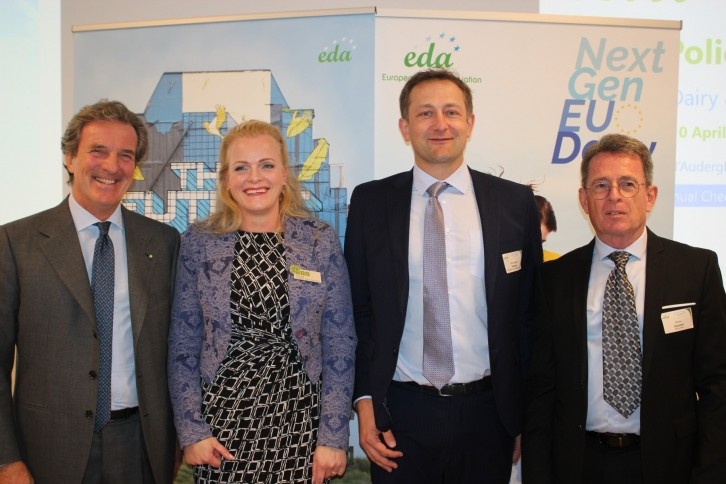
Christophe Hansen, a Luxembourg MEP from the Christian Social People’s Party (CSV) was joined by MEP candidates Jessika van Leeuwen from the Netherlands’ Farmer-Citizen Movement, and Didier Leportois from France’s Rural Alliance.
The three speakers agreed that farmers had been put under pressure by European policies in recent years and that EU produce’s authenticity should be better protected from imitation products in export markets. There were also calls for a less rigid approach to land use regulations and emissions reductions.
Less regulation, more innovation
Addressing the conference, Jessika van Leeuwen said farmer protests had helped mitigate ‘some of the most oppressive regulations’ but ‘it’s not enough, and it might be too late’, claiming that ‘a tsunami wave of dairy farmers’ were quitting in the Netherlands and blaming left-wing politics for creating ‘an imaginary polarization between nature and food production’. She explained her party wants the EU to protect ‘fertile grounds and highly productive areas’ in a scheme akin to Nature 2000, to ease farming and food production.
She also wants the Nature Restoration Law scrapped, hybrid dairy products ‘forbidden’, the introduction of on-farm ESG measures avoided, and to ‘convert the Green Deal into a real deal, where objectives are realistic and affordable’. Leportois shared a similar sentiment, arguing in favor of incentivizing farmers and supporting agrifood technologies rather than prescribing targets.
Hansen too spoke of a more accommodating approach towards agrifood producers, stating: “Farmers are often seen as the problem and not as the solution, and we all know that we need and we want quality foodstuffs produced, preferably inside the European Union, so we should not just push them out.
“We should not be so focused on figures to be achieved – of course, that is something that we have at the back of our minds – but what are the technologies that can decarbonize or lower the emissions of the agriculture sector overall. Not just say ‘OK, this is the figures and we will achieve them if 10% of the farms are stopping’; that is not what we need.”
Van Leeuwen added: “We support the continuous development of more sustainable, highly productive agriculture, but plead for a reduction of rules so there is more room for innovation to be developed. Environmental protection laws need to be customized per area instead of a one-size-fits-all approach. Objectives need to be reasonable, feasible and affordable. And we need to make sure we have and keep an equal playing field on our internal European market but also with our external trading partners to ensure our food producers have a decent and sustainable income.
“We have to have faith in our industry and our farmers and in their innovative minds that they can reach it, but if we put on top of them laws and we fix numbers that they have to achieve by a certain year or time frame, it is not going to work, because everybody is going to stress out instead of being creative and finding the right solution.”
Leportois, himself a dentist and a private breeder from Auvergne-Rhone-Alpes region, said that 30 of The Rural Alliance’s 81 candidates are farmers. “We [have] exactly the same position – the future must be built on the improvement of technology and science and not on ideology. Ideology leads to sadness and lack of perspective. We have to build on incentives and not just blank obligations.”
Regulators want data
For the European regulators, however, a data-driven approach is key to demonstrating the sector’s progress and how that fits into the bigger EU27 picture.
Wolfgang Burtscher, director general for Agriculture and Rural Development in the European Commission, told the conference that ‘the sustainability issue will continue to be on the agenda’ in agriculture and warned: “We put a lot of effort in designing policy instruments and funding rules that ensure that farmers are in compliance with these rules…but we are much worse at measuring what these measures produce.”
“One element is certainly greenhouse gas emissions, which will concern the livestock sector,” he added. “I perceive that sustainability of the livestock sector will be an important issue. But we need to have a holistic policy – we cannot only look at emissions; we need to look at all elements of farming, the importance of rural areas and the maintenance of landscapes. All these things are interlinked.”
‘We are not against everything’
We asked Jessika van Leeuwen and Didier Leportios why they were opposing emissions reduction strategies. “It’s not that I am against targets,” Van Leeuwen told DairyReporter at the conference. “The problem is with the time span. If you see the power within the farmers to innovate, where we came from and where we stand today, we’re continuously moving; but we make objectives that are just not feasible.”
So what targets would be feasible, we asked. Is the 2050 net-zero target too soon? “It is complex,” Van Leeuwen said. “I am not the person to tell you if it is feasible, because I don’t know all the numbers.
“It’s not that we are against getting as far as possible, but by just fixing it so strongly, you leave people no room. And you put people in a stressed situation where there is no creativity anymore. That, I think, is not helping the cause.”
Asked what she meant by creativity and innovation, the MEP candidate elaborated: “[I mean] innovation as in the general sense of the word, so it can be in traditional things like housing. I’m working in the animal feed business myself, so if we think we can lower a lot of the nitrogen emissions, for instance, we’re not [just] thinking about it.”
On his opposition to emissions targets, Leportois told us: “We are not against everything, you know. We are not old school. We know that evolution is necessary, but not too fast. People have to have the possibility to adapt gradually and to be part of the system, not to suffer from it.
“So there are measures that must be taken, but not too fast, not everything at the same time, and share solutions with the professionals and see what they are able to do, what is sustainable from a financial point of view, and then it will go ahead, but not as fast as it’s going now.”
We also asked the candidates about how they would approach dairy alternatives regulations. During the Q&A, Van Leeuwen said banning hybrid dairy was something on her wish list: “I have another wish, and that is…forbid hybrid products because we cannot be abusing good dairy proteins and mixing them with vegetable proteins and nutritionally misleading customers in thinking that they’re buying something nutritious; that has to be forbidden.”
With food companies including dairy majors already investing in this segment, would Van Leeuwen discourage producers from manufacturing such products if she was elected? “I think you need to be very honest and when you make these products, you need to be very honest about the nutritional profile that the product provides,” she told us. “And you need to be very honest on your pricing, because vegetable protein is a lot cheaper than animal protein.
“So then you need to price accordingly, because now people have the perception that they’re buying an equally nutritious product, or maybe even a healthier product. They need to pay the full price. I am all for people can eat whatever they want to eat, but it needs to be clear and transparent. And I think it’s not the same.”
On the same subject, Leportois added: “We cannot avoid them [dairy alternatives], but the farmer must be considered.”
Dairy alternative products are already banned from using descriptors like ‘butter’ and ‘cheese’ in the EU. There is a lack of concrete evidence on whether shoppers confuse dairy alternatives with traditional dairy, but the issue remains contentious for both regulators and food groups, particularly with regards to labeling rules.
What food companies think
So what did representatives of food companies and dairy co-ops make of the MEP candidates’ views on target-setting and emissions reporting, land use policies, and sustainability incentives?
“We already have our Climate Plan in place with the aim to produce net climate-neutral dairy by 2050,” said FrieslandCampina’s Sanne Dekker. “ We have a clear roadmap for our 2030 emissions reduction targets for scope 1, 2 and 3 emissions and are well on track to reach these. Of course, we support greater positive incentives at EU level for dairy farmers to help accelerate sustainable measures; making a transition to more sustainable farming financially viable is essential, after all.”
Valio’s Anna-Kaisa Auvinen told us a more tailored approach to land use would be welcome. “We have our own climate program and I think we are addressing these issues already; so we are not afraid about what the regulation [on climate targets, ed.] is going to be.
“But I think it would be better if we would have more space for innovations if we don’t have such strict regulation. Because the farming conditions are very different in Northern Europe and in the South, but regulations don’t always reflect this.
“And in other areas, there is too much regulation; for example, the Deforestation Act, which many here wouldn’t think would apply to dairy farms at all. But in Finland and Sweden, there are lots of forests; if we want to have bigger grazing areas, we have to look at some of the trees also.”
Antoni Bandrés, director of food supply at Danone Iberia, was in favor of more standardised rules. “We need to have, across the whole value chain, the whole dairy sector, we need to have just regulations to secure the quality of our products to the consumers,” he explained. “I know that regulations sometimes are tough, but we need regulation to demonstrate and to secure this quality of dairy products to the consumers.
“[We need it] in terms of food safety, but also in terms of emissions, we need a standardisation across Europe in order to know how we are and where we are headed. Because nowadays there are many voices saying that we are producing less emissions, but what is behind [this claim], what kind of measurement?
“Nowadays we have no transparency because there isn’t a unified way to measure things. And if we are talking about carbon or methane emissions, there is no uniformity [either].”
“If we have one rule across Europe and all of us follow this rule, it’s easy to compare. And it delivers transparency to the consumer.”
Marquis Who’s Who Honors Jack Huang for Expertise in Food and Manufacturing
SANTA CLARA, CA, April 19, 2024 /24-7PressRelease/ — Jack Huang has been selected for inclusion in Marquis Who’s Who. As in all Marquis Who’s Who biographical volumes, individuals profiled are selected on the basis of current reference value. Factors such as position, noteworthy accomplishments, visibility, and prominence in a field are all taken into account during the selection process.
Mr. Huang has established himself as a prominent figure in international business, particularly in the import and export sector. He serves as president of Calway Foods Inc., a business he founded in 2008 after discovering and falling in love with pecans, which were unavailable in his home country of China. Mr. Huang’s career is marked by significant achievements, including being one of the first to export pecans to China. Before founding Calway Foods Inc., he began his career in finance, working at institutions including Cathay General Bancorp (formerly General Bank), First Bank & Trust, and Heritage Bank. Mr. Huang’s commitment to his profession is further underscored by membership in organizations such as the Georgia Pecan Growers Association and the Silicon Valley Capital Club.
Mr. Huang’s educational background laid the foundation for his successful career. He earned his bachelor’s degree in English and America Literature in China prior to moving to the US and subsequently received a master’s degree in finance from Golden Gate University in San Francisco, a feat he paid for by working part-time at restaurants while taking classes. He has continued his lifelong dedication to learning, gaining Toastmasters International and Leadership Morgan Hill certifications.
The drive behind Mr. Huang’s success can be traced back to his passion for fostering better relationships between China and America through cultural understanding and business collaboration. His ability to navigate both Chinese and American markets has allowed him to assist companies in expanding their reach across Asia. Moreover, Mr. Huang’s commitment to mentorship has enabled many young professionals to excel in their careers, reflecting his belief in the power of education and guidance. He has hired, trained, and inspired many students and fresh college graduates interested in international business with no prior work experience. He is also a frequent speaker at various industrial conferences and universities, including The Center for Asian Business D.K. Kim Foundation Lecture Series at Loyola Marymount University (LMU) Doing Business in Asia Pacific: An Exemplary Success Story in April 2022. He considers obtaining U.S. citizenship one of his most significant achievements.
Outside of his professional life, Mr. Huang is actively contributing to socially disadvantaged communities through funding initiatives for the City of Morgan Hill and participating in missionary work as an interpreter for several churches in China. He mentored two international business classes at LMU and is an advisor to AAPI F3, a non-profit that empowers female entrepreneurs to succeed in business and promotes gender equality in the entrepreneurial ecosystem. His accolades include Calway Foods Inc. being named Exporter of the Year by the U.S. Department of Commerce in 2021 and being awarded Entrepreneur of the Year by both the Sacramento Minority Business Development Agency (MBDA) and the U.S. Department of Commerce in the celebration of AAPI Heritage Month in 2021, an Asian American and Pacific Islander Initiative. His story “Pecan Power Exporter Shares His Journey” was featured on the Pecan Report (https://www.pecanreport.com/news/pecan-power-exporter-shares-his-journey/), the most respected industry report for the pecan industry in the U.S.
In his personal life, Mr. Huang enjoys traveling, playing golf, and working out. Looking ahead, he is focused on expanding Calway Foods Inc.’s operations by establishing a processing facility within the United States. This strategic move aims to enhance the company’s capacity to export American goods while fostering economic growth and creating employment opportunities domestically. Through this endeavor, Mr. Huang seeks to further cement his company’s standing on the global stage while contributing positively to international trade relations.
About Marquis Who’s Who®:
Since 1899, when A. N. Marquis printed the First Edition of Who’s Who in America®, Marquis Who’s Who® has chronicled the lives of the most accomplished individuals and innovators from every significant field of endeavor, including politics, business, medicine, law, education, art, religion and entertainment. Marquis celebrates its 125th anniversary in 2023, and Who’s Who in America® remains an essential biographical source for thousands of researchers, journalists, librarians and executive search firms around the world. Marquis® publications may be visited at the official Marquis Who’s Who® website at www.marquiswhoswho.com.
# # #
Extreme heat in 2023 linked to drastic slump in growth of marine life

High sea temperatures can hinder the growth of algae such as kelp
Pete Niesen/Alamy
Record-breaking sea temperatures in 2023 may have triggered an unprecedented global decline in the growth of phytoplankton and algae, which form the base of the marine food web.
Last year, swathes of the world’s oceans were gripped by extreme marine heatwaves, caused by climate change and a transition to hotter El Niño conditions in the Pacific Ocean.
On average, on any one day…
Sign up to our weekly newsletter
Receive a weekly dose of discovery in your inbox!
We’ll also keep you up to date with New Scientist
events and special offers.
Sign up
Cocaine seems to hijack brain pathways that prioritise food and water
Health
Cocaine and morphine hijacked neural responses in the brains of mice, which resulted in them consuming less food and water
By Tom Leslie

Illustration of the reward pathway in the human brain
FERNANDO DA CUNHA/SCIENCE PHOTO LIBRARY
Persistent use of drugs such as cocaine and morphine is thought to affect the way the brain prioritises the body’s basic needs — and we are now getting to the bottom of how this comes about.
When people repeatedly misuse drugs, they might see long-term changes in their behaviour that lead them to choose to take drugs instead of doing essential things like eating and drinking.
A brain pathway called the mesolimbic reward system is suspected to be involved in this process, but few studies have directly compared the system’s response to taking drugs with the response of innate needs being met.
Now, Bowen Tan at Rockefeller University in New York and his colleagues have shown that the same neurons are activated in these two circumstances. They uncovered this using a sophisticated microscopy set-up that allowed them to track the activity of individual neurons in the brains of mice going through withdrawal following repeated exposures to these drugs.
“The field has long been debating whether there is a specialised cell type that encodes drug value only and a specialised cell type that encodes natural reward value only,” says Tan. “What we saw is that these drugs of abuse commonly activate the same set of neurons as the natural rewards.”
The researchers also observed that the neural response to satisfying basic needs became disorganised after the mice were given cocaine or morphine, which occurred alongside a decreased consumption of food and water.
“What is really notable about this finding is that strong neural responses to food or water almost become displaced by responses to drugs,” says Jeremy Day at the University of Alabama at Birmingham. “[This suggests] that drug rewards are able to override how the brain translates need states into behaviours that satisfy those needs.”
Tan and his team also identified a gene, called Rheb, that seems to be necessary for drugs to have this effect. Rheb is part of a cell-signalling pathway that is also found in people, so future work could investigate how inhibiting this pathway could be used as a therapy for substance misuse, he says.
Topics:
Chris Pappas: Would-be Premier’s message of hope for embattled KZN
Just as his party is able to use its governance of the Western Cape as a ‘prospectus’ for voters, uMngeni executive mayor Christopher Pappas (32) can point to his own record since taking office in November 2021. And the fluent isiZulu speaker believes it’s a message resonating in a province where there is a growing realisation what you do at the ballot box can make a difference. With support for the ANC collapsing in KZN after the emergence of Jacob Zuma’s MK party, Pappas offers thoughts on the issues which will determine how votes are cast on May 29 – and shares his own message of hope for those in the embattled province. He spoke to Alec Hogg of BizNews.
Sign up for your early morning brew of the BizNews Insider to keep you up to speed with the content that matters. The newsletter will land in your inbox at 5:30am weekdays. Register here.
Watch here
Listen here
Summary of the nterview
In the interview with Chris Pappas, the focus was on his campaign as the Democratic Alliance’s premier candidate in KwaZulu-Natal (KZN). Pappas emphasized the need for change in KZN, positioning himself as a fresh alternative to the long-standing leadership that many feel has left segments of the population behind. He highlighted the DA’s track record in the Western Cape as a template for effective governance, emphasizing tested solutions to issues like water scarcity and crime. Pappas promoted a message of hope, steering clear of negative political bashing and focusing on the opportunity for positive change.
Regarding coalition politics, Pappas explained the DA’s approach of involving provincial actors in decision-making while aligning with broader national strategies. He expressed openness to coalition partnerships, particularly with the Inkatha Freedom Party (IFP), aiming to create constructive multi-party politics to address challenges and deliver on promises to voters.
Overall, Pappas’s campaign centers on presenting the DA as a credible and experienced choice for KZN, emphasizing tested solutions, hope for change, and a willingness to collaborate with diverse political partners for the province’s betterment.
Extended transcript of the interview ___STEADY_PAYWALL___
00:00:10:12 – 00:00:39:07
Alec Hogg: Well, Christopher Pappas has seemed to have been on the scene for ages now. He’s only 32 years old, but the executive mayor of the uMngeni Municipality in KZN has had quite an interesting journey. We’re going to catch up with him today on how things are going in that province for the premier candidate of the Democratic Alliance.
00:00:39:09 – 00:00:58:22
Alec Hogg: Yeah, Chris, I say a lot’s happened. My goodness, since we last spoke, the chief whip of the DA in your municipality was murdered. Before we go into more pleasant issues, have you had an update? Have the murderers been found?
00:00:59:00 – 00:01:21:10
Chris Pappas: Yeah. So there’s the official updates from the police. And then there’s what we know. Sorry. I mean, good afternoon. First of all, I haven’t seen you in a long time, so, yeah, there’s, as you know, the DA is working with private investigators on this as well, as one of a donor came forward and said they would offer a million rand for information that would lead to an arrest.
00:01:21:10 – 00:01:45:23
Chris Pappas: So that’s allowed us to work with AfriForum, with their investigative body, with Gerrie Nel and his team, and they’ve been working sort of parallel to what the police are doing, and that is to keep constant pressure on the case. What we saw at the end of last week, yes, about Friday, Thursday, Friday last week was a wanted notice put out by the police.
00:01:46:01 – 00:02:06:01
Chris Pappas: And that’s sort of a big break, sort of a big breakthrough. It’s put a face to just some of the crime in the area. And one of the crimes that is linked is this particular murder. So we are hopeful that progress is being made. We don’t think that progress would have been made if it wasn’t for this team working in the background who’s highly professional and very skilled.
00:02:06:03 – 00:02:23:07
Chris Pappas: But, yeah, we are still hopeful for justice, and it’s not just this particular case that is linked to criminal activity. There are a number of crimes around that area that all seem to lead back to the same person, same place.
00:02:23:09 – 00:02:38:08
Alec Hogg: Nhlalayenza Ndlovu was he in any way politically involved? In other words, we’ve known that in KZN, in particular, political assassinations happen quite often. Was it anything to do with politics in his murder?
Read more: How Rupert fought with PW & Verwoerd over Apartheid
00:02:38:10 – 00:03:02:18
Chris Pappas: So yes and no. I mean, he exists and works within the political space, and the motivation for the murder itself is believed to be linked to the ongoing program as a municipality to reduce organized crime around electricity theft and municipal infrastructure-related issues. But within this mixture, you know, that’s where the politics comes in.
00:03:02:18 – 00:03:27:08
Chris Pappas: ANC councilors instigating but bringing spreading misinformation. The person that we think ordered the crime is also very politically involved. So it’s not necessarily dubious ANC, you applaud him for that, you know, that sort of a situation, but it really does involve politicians as a whole.
00:03:27:10 – 00:03:58:12
Alec Hogg: It’s a very dangerous occupation to be in the political sphere in South Africa, but also at the moment, very turbulent, particularly in your province. We’ve seen the emergence of Jacob Zuma into the fray, the MK party getting a lot of support. According to the pollsters. We have a piece on business today. Where RW Johnson has tracked back, an organization, a media organization that’s supporting MK being funded by the Kremlin.
00:03:58:14 – 00:04:10:00
Alec Hogg: So it’s big stuff that’s going on there. Perhaps you can give us some insight from your perspective on exactly how this is all playing out, given that you are the premier candidate for your party in the province.
00:04:10:04 – 00:04:47:00
Chris Pappas: Yeah. So it’s a very, very interesting times in politics in KZN. I think it’s it’s always been an interesting province. I usually call it a bit of a, it’s a bit of an outlier. A lot of the English media attention is usually driven by Gauteng and the Western Cape, and we have in KZN this different phenomenon where the majority language is IsiZulu, so there’s a whole different sort of narrative, a whole different discussion that takes place here in KZN that often misses the English and Afrikaans media that happens at a national level, which does get which, which
00:04:47:00 – 00:05:07:16
Chris Pappas: is interesting when you’re on the ground. So again polls are a glimpse in time, and different people have different opinions on it. But I think what has emerged is that the MK has gained a lot of traction in this province, and you can actually see it on the ground, you see their motorcades, you see their banners, you see their t-shirts in places where you wouldn’t expect them, and it’s all over the province.
00:05:07:16 – 00:05:39:19
Chris Pappas: It’s not just in the urban areas or in the big centers. The ANC is not as visible as it usually is on the ground. Their big Door-To-Door campaigns are much smaller than they usually are. I mean, they we’ve still got a couple of weeks before the election and they and they’re good at pushing out numbers 2 or 3 weeks before that, but really not as much campaigning that we’ve seen from them. The IFP, a huge focus on the north, all over the province, sort of, you know, yond, beyond Balito.
00:05:39:20 – 00:06:04:07
Chris Pappas: So upwards, and into the, you know, traditional Zulu land area, and the DA gaining traction in a lot of different communities. So, you know, a traditional sort of support base remains strong here, and this new appetite within peri-urban and rural areas, which we’ve seen, which is very interesting and very hopeful for our growth.
00:06:04:09 – 00:06:23:15
Chris Pappas: But yeah, it’s such an interesting time in KZN every, you know, every time you think things are stabilizing, something profound in our sense happens, whether it’s snatching of the mic or the Zulu king issuing a statement or by someone losing a by-election. So there’s always these things that are thrown in to keep a political conversation going.
00:06:23:17 – 00:06:35:08
Alec Hogg: And as far as you’re concerned, being fluent as you are in IsiZulu. Does that give you an insight? Perhaps that people who don’t have that connection or that understanding would not have.
00:06:35:13 – 00:06:54:17
Chris Pappas: I think yes, it does. I mean, you know, as I say that we have the majority of the population in this province is IsiZulu speaking. So whether it’s engaging with this new media, whether it’s engaging with these Zulu influencers or sort of people who drive popular culture, whether it is just being with their communities.
00:06:54:19 – 00:07:20:22
Chris Pappas: Yeah. You’re able to gather a sense of what the political landscape is. And I think more so than before here in maybe 2014 and again in 2019, there’s a better understanding. And by everyone in KZN about the power of the vote, is that this loyalty that was given to the ANC sort of back in 2004 and beyond, it has waned.
00:07:21:00 – 00:07:42:07
Chris Pappas: People have changed their votes in different municipalities. People have, I mean, we’ve seen a lot of municipalities shift hands. We’ve seen different political parties arise. The ABC, MK, and a number of other parties, NFP. So KZN, more than a lot of provinces, people change their vote when the message is compelling enough for people to do so.
00:07:42:07 – 00:07:46:03
Chris Pappas: And I think the ability to engage with that segment of the population really does help.
00:07:46:05 – 00:08:08:20
Alec Hogg: But that’s very, very constructive, Chris, if you think about a democracy where people are no longer blindly following a party because it is the favorite football team, but in fact, because they know what the party can do for them. And I guess there might be more maturity amongst the population than many people, particularly many pollsters, are giving it credit for, you.
00:08:08:21 – 00:08:28:14
Chris Pappas: Know, without shooting down political analysts. I mean, they’ve got a role to play in our political discourse. But I think a lot of the time when you’re actually on the ground, when you’re speaking to people in communities, when you have to deal with complaints, when you’re in people’s homes, you get a very different understanding of what the average South African is feeling like.
00:08:28:14 – 00:08:58:15
Chris Pappas: And in that and in KZN, that’s obviously a bit different. I think there’s a number of different things. I mean, this idea that democracy can change your future, in other words, your vote has an impact on your life circumstances. I think people are realizing that more and more. I think the narratives around race are weaker in this election. Apartheid is going to come back and all of this sort of propaganda that’s usually put out, ends.
00:08:58:17 – 00:09:26:20
Chris Pappas: So, there’s a different feeling and a different conversation that’s happening. And it’s what usually happens during elections. It is also, I mean, there’s a gap as well. A lot of what is happening in KZN is personality-driven. There’s relatively little conversation about plans now. You usually vote for a political party because there’s some sort of track record or plan to fix something.
00:09:26:22 – 00:09:52:18
Chris Pappas: But there’s a lot of personality politics that’s taking place in KZN. and figures that, most people on the national stage don’t know about, whether it’s P.G Mavundla. or I mean, everyone knows Jacob Zuma, but, we have our local, our local characters who carry some sort of command or influence over, the political discussions.
00:09:52:23 – 00:09:58:12
Chris Pappas: And those are always interesting to participate in that all lend to a changing political landscape.
00:09:58:14 – 00:10:07:12
Alec Hogg: What about the Zulu king? Does he have great influence? And indeed, does he endorse any party or any candidate?
00:10:07:12 – 00:10:24:01
Chris Pappas: So now he’s made his position clear, and many of his Amakhosi and izinduna do the same. They will say this when we allow free campaigning. We don’t take any side. But I think what we have seen is that I think he got off to a bit of a rocky start in the beginning.
00:10:24:01 – 00:11:04:05
Chris Pappas: Like you would expect any new leader who’s taking over something so big with such a big history. And possibly had some of the wrong people around him at the time, whether it was his spokesperson or others. And I think he’s really found himself now as a leader. He’s got good people around him. All these people are giving him better advice, and he’s able to be more authoritative in putting down the views of the Zulu royal household, as opposed to having to pander to political parties, as they flop and change their decisions and try to appeal to him for more.
00:11:04:05 – 00:11:30:00
Chris Pappas: for more political acknowledgment, I guess, which is great. I think that and it shows it shows that he’s finding himself in his new role, and also redefining the Zulu monarchy in this province, which for a while has been beholden or seemingly beholden to the provincial government, who’s a large funder of the, you know, of their activities of the household.
00:11:30:02 – 00:11:48:13
Chris Pappas: But yes, I think in terms of his influence over what people think and say in what the popular topics are when he does engage, when he does voice his concerns about things, people do listen in KZN.
00:11:48:15 – 00:12:11:02
Alec Hogg: At the BizNews conference, R.W. Johnson let slip ahead of eNCA’s poll, which he’s looking after, that the ANC was down to 13%, one 3% in KZN. That is something that has been reinforced elsewhere as well. And he said that if you didn’t know better, you would think that this was the province that was about to secede.
Read more: Netanyahu’s crossroads: Clap back at Iran or heed allies’ calls for restraint
00:12:11:02 – 00:12:37:04
Alec Hogg: Rather, forget about Cape Independence. It ties it in with only 13% to the national government. It appears as though there’s a very different view that happens in the province. Now, when you look at that from the way forward and the breakdown of the different parties, where it seems like it’s going to be quite difficult for any coalition to get or any obvious coalition to get control.
00:12:37:09 – 00:12:46:02
Alec Hogg: Are you seeing that being a stress in the future or being at least, a demand for greater devolution of power for that province?
00:12:46:02 – 00:13:09:21
Chris Pappas: I think, yes and no. I think there’s a lot of political sort of agreement across all parties in KZN. I mean, we are a big province that has a lot of national influence. So there is a lot of agreement across different political parties for a call for devolution of different powers. You know, the Gauteng ANC has called for a devolution of policing powers not so long ago.
00:13:09:23 – 00:13:28:06
Chris Pappas: That’s the thing. That’s something that the DA is obviously pushing hard for in both the Western Cape and as part of my pledges to the voters here. And there’s a number of different things that we’re asking for in local government. I know that the ANC here is calling for greater devolution to the local government that the IFP wants more power.
00:13:28:06 – 00:13:49:09
Chris Pappas: I mean, they are a federal party as well. So, yes, I think there is a broad consensus amongst political parties in KZN that provinces need more, need more power. Obviously, that needs to be done in a way that doesn’t undermine national government. It needs to be done in a way that keeps the unified states, and it needs to be done in a way that doesn’t support incompetence.
00:13:49:09 – 00:14:12:05
Chris Pappas: You don’t want to devolve power to an incompetent government. In other words, a government that is not capable of delivering. So while the notion might be the same, the practicalities of devolving those different powers are different. But I do think that there is a sense of unity amongst KZN voters that KZN is a different province.
00:14:12:05 – 00:14:36:05
Chris Pappas: We have our own history. We have our own problems to deal with. We have our own unique traditional structures of leadership that we have to deal with. We have obviously the Ingonyama trust. We have the IFP and the ANC history. So there is definitely a unique identity that the people of KZN feel and see for themselves across different racial backgrounds, religious backgrounds.
00:14:36:05 – 00:14:57:20
Chris Pappas: There really is a sense of being in KZN. The polls are interesting a glimpse in time they’ve got margins of error. How you calculating all differs. But I think what we’re seeing is exactly what you’re saying is that an almost complete collapse of the ANC in this province, which is the ANC stronghold, really?
00:14:57:20 – 00:15:15:10
Chris Pappas: It’s their birthplace. It’s their stronghold. And it is. I would be worried about them. I don’t think they’re going to end up as bad as some of the worst polls have them up. It’s still a very big organization with a long history of deep structures. But the MK, in particular, has done some serious, serious damage to the ANC in this province.
00:15:15:13 – 00:15:34:22
Alec Hogg: And what about you personally? Because you are the provincial premier candidate. So how does that all work? Could you just explain that to us?
00:15:34:23 – 00:15:54:06
Chris Pappas: I’m number one on the KZN list, which means that the first seat that is allocated towards the DA in the provincial legislature is mine. And that is party policy. Usually, the premier candidate ends up number one on the list.
00:15:54:07 – 00:16:17:14
Chris Pappas: So does the party’s presidential candidate. That’s going to be interesting to see where the results end, you know, will I be premier in a DA outright majority? Will I be a premier in a coalition? Will I be an MEC in a government where we are a minority partner? Or will we have to go to the opposition benches to keep doing the good work there?
00:16:17:16 – 00:16:19:08
Chris Pappas: So that’s what we’re pushing for for the 29th.
00:16:19:13 – 00:16:24:12
Alec Hogg: So it does mean that you’re going to be leaving your position as the executive mayor of uMngeni.
00:16:24:12 – 00:16:34:04
Chris Pappas: Well, yeah. So if I take up a position in the legislature, whether it is in opposition or in government, that would mean that I’d have to step down as mayor.
00:16:34:09 – 00:16:55:18
Alec Hogg: You don’t feel that the job isn’t quite done. I was looking at Good Governance Africa. And you’ve surged up the charts but still 55 in the country. I’m sure you would have liked to have been number one in the country before you handed over the reins. Did you do you have someone competent to give it to it’s or you comfortable that you’ve done as much as you can?
00:16:55:19 – 00:17:33:13
Chris Pappas: No, I mean the job is not done and there’s still a lot, a lot more to do. There’s massive issues that we have to resolve with finance and with infrastructure backlogs. And those have to be solved. So the work is it isn’t done. But to have a sympathetic, competent working provincial government, if I get the opportunity to do that, to bring what I’ve learned, especially around local government with the bread and butter of service delivery is then I think that not only helps the DA and people of uMngeni, but it also helps other small municipalities across KZN who feel now the provincial.
00:17:33:13 – 00:17:52:07
Chris Pappas: Government in this province. And if you’re not an ANC-run municipality, you get constant love letters. You’re getting, you know, constantly scrutinized. You never get assistance or very seldom get assistance. And to have a government that looks beyond just political lines to make local government work, to make small towns and cities work which I think will be helpful for KZN in general.
00:17:52:09 – 00:18:23:08
Chris Pappas: But yes, I’m not alone. I work with a great team of very competent councilors that, you know, stretch from rural to urban, from old to young, women, men learned people, sort of life experience people. So it’s it really is a capable team. And my deputy mayor, has over the years or over the last sort of 28 months found himself, in having a lot more responsibility, especially now in the last sort of 5 or 6 months with campaigning.
00:18:23:10 – 00:18:51:16
Chris Pappas: And we also built a good, staff team is to get staff proponent in the municipality. We’ve got rid of nine senior managers. We’ve filled a lot of I think we’ve we’ve hired 42 staff members. Many of those with very specialized qualifications are on engineering or, legal or whatever it might be. And that is starting to see the municipality move in a way where we as those political oversight don’t have to be involved in, you know, sort of nitty-gritty day-to-day stuff, but things are starting to flow easily.
00:18:51:16 – 00:19:07:16
Alec Hogg: So you’ve got the template there. It’s almost like the DA has got the template of the Western Cape for the rest of the country. What’s your campaign in KZN? How are you positioning yourself as the premier candidate that will attract voters to your party?
Read more: Eskom report says SA’s rooftop solar generation doubled in two years
00:19:07:16 – 00:19:29:21
Chris Pappas: So, there’s a few things. I think the first thing is that I’m working in a space with much older people, and there’s a large segment of the population in KZN that feels left behind. That’s the people who have been in charge for a long time. I think what John uses the expression, “the same people at the same table making the same decisions,” and they have been there for a very long time, and people are looking for something new.
00:19:30:01 – 00:19:46:11
Chris Pappas: And that’s something, not just new, but something that has been tested. And I think that’s the first thing. So I’m young but not too young, not too old. The tested part is, well, I’m in government, I’m running a municipality, I’m trying to fix something that is broken, and there are visible signs of it getting better.
00:19:46:13 – 00:20:04:15
Chris Pappas: The other thing is then, I mean, the DA as an institution. We’re the only other political party that runs a province in this country. So in terms of like for like, you can compare our ANC-run KZN to the DA-run Western Cape, and of course, there are still problems in the Western Cape and they have their challenges to solve.
00:20:04:17 – 00:20:22:19
Chris Pappas: But on a comparative basis, there are things that are happening that are not happening here. So you can make that comparison, to two people at the end of the day is that we’ve actually got a credible plan, credible message. You know, what are those solutions to water? Well, we got through day zero and we’ve learned lessons there.
00:20:22:19 – 00:20:43:18
Chris Pappas: What about solutions to crime? Well, we’re implementing them in different parts of the country and in municipalities, in infrastructure, well, all the rest of things that are problems as a province. So I think that’s the main message that we are tried and tested. We have a candidate who is young, dynamic, that can actually go out, engage across different communities.
00:20:43:19 – 00:20:54:10
Chris Pappas: That’s rural, urban, black or white, whatever it might be. And that we are a party that is, that is even in this province, tested our own policies to try to turn things around.
00:20:54:10 – 00:20:56:06
Alec Hogg: So a message of hope rather than fear.
00:20:56:09 – 00:21:18:08
Chris Pappas: Absolutely. We really do try to stay away from engaging in other political party bashing. We try and, most if you go into my campaign, if you go onto any of the provincial platforms, we’re saying, you know, it is about hope. For the very first time, we have an opportunity to change government.
00:21:18:10 – 00:21:42:14
Chris Pappas: In this province, you know, so we had what we had to after democracy. We’ve had the same thing for a very long time now. Now we once again been given that opportunity. So it’s about hope and winning. I think it will actually be part of a winning team. And in KZN, we have an opportunity for people to be part of a winning team, whether it’s winning against unemployment or winning against infrastructure backlogs or winning the election.
00:21:42:14 – 00:22:04:23
Chris Pappas: We have a credible path to change the circumstances of what we have. We have great communities in KZN. I was just at Margate yesterday, communities, businesses come out, fix their roads and the beaches that have washed away. And it happens everywhere. We just really have great people, great communities who look after each other, and people want to harness that to rebuild our province.
00:22:05:01 – 00:22:34:09
Alec Hogg: Now Helen Zille and John Steenhuisen have been asked many times about their coalition partners in the future. But let’s look at it on a provincial level. Would the DA in KZN make its own decisions, or would it have to come from the Federal Council, for instance, if you, the IFP and the ANC had enough votes to get above 51% theoretically, just hypothetically, is that something that you, as the premier candidate, would make a decision on?
00:22:34:09 – 00:22:39:20
Alec Hogg: And would you go into a coalition with those partners, or would it have to come from somebody else?
00:22:39:23 – 00:22:57:00
Chris Pappas: So how we work is that we try and remove people from the decision-making process who have a vested interest. In other words, you know, I really want to be premier. So if someone comes to say to me, can I make a government to work with whoever it might be, I’m going to tell you, yes, it might be really difficult and I might not be able to see through some of the fog.
00:22:57:02 – 00:23:27:13
Chris Pappas: So what we do is that we have provincial actors, whether it is the provincial leader or the province chairperson, whoever it might be who are involved in the negotiations, but those people form part of a much broader national team as well. At the end of the day, we are a party that has a national footprint and we don’t want to do is have decisions made at a provincial level, even at a local level, that compromise the values of the organization over the long-term strategic use of the organization, our promises to voters, promises to partners like in the multi-party charter.
00:23:27:15 – 00:23:52:16
Chris Pappas: So, yes, it’s a bit of a mixture, but I don’t get involved directly, my opinion is solicited. My inputs are involved in there but at the end of the day, it is a national and provincial function to go and put that together, considering all the other discussions that happen around other provinces. And, our pledges to voters, I think we’ve made it absolutely clear that the ANC is not a partner that we can work with at the moment.
00:23:52:16 – 00:24:11:13
Chris Pappas: It is that it is it is to why would we work so hard to remove someone from government only to go back into government with it. IFP is a bit different. We are actively trying to work with IFP. We have been even before the multi-party charter. Charter, with two main objectives.
00:24:11:13 – 00:24:35:10
Chris Pappas: One is to remove the ANC from government, but the other is to actually make sort of multi-party politics work. We started service delivery agreements here in this province before the multi-party charter. And that was how do you take organizations with independent identities and independent voter bases that are trying to grow themselves, but at the same time not compromise on each other’s ability to hold each other accountable.
00:24:35:12 – 00:24:43:15
Chris Pappas: But then also to do so constructively where there are problems. Let’s try to fix them before we engage in the sort of politics that we’ve seen over the last 30 years.
00:24:43:15 – 00:24:51:07
Alec Hogg: Christopher Pappas is the premier candidate for the Democratic Alliance for KwaZulu-Natal. And I’m Alec Hogg from BizNews.com.
Read also:
- How poor governance has caused SA’s unemployment crisis: Ann Bernstein
- Migration has become an election issue in SA and across the globe
- Election’24: Is the ANC-MPC coalition the “least worst option”? – Katzenellenbogen
Visited 1,858 times, 1,858 visit(s) today
MAILBOX: ANC doesn’t focus on growth anymore, only consuming
In this Mailbox critique, the author, writing under the pseudonym Thusasizwe Sithole, uses a vivid analogy likening the behaviour of South Africa’s political parties, particularly the ANC, EFF, and MK, to scavenging animals feasting on a carcass.
Sign up for your early morning brew of the BizNews Insider to keep you up to speed with the content that matters. The newsletter will land in your inbox at 5:30am weekdays. Register here.
From Thusasizwe Sithole*
The way to think of the ANC and it’s socialist derivatives, the EFF and MK, is the observed behaviour of hyenas, vultures and jackals feeding on a carcass under the African sky. There is a hierarchy of authority at the carcass and an enormous amount of squabbling and bickering about who gets to feed on what morsel. But the feeding can only take place off a dead animal, so it’s a zero-sum dynamic where one party’s gain equates to another’s direct loss. Such dynamics are inherently volatile and competitive; therefore, they have a high conflict potential.
To give greater depth to this analogy, we overlay it with the sociological concept of Anomie. This describes the endless desire for more gratification, devoid of any norms, so it becomes a destructive process of self-gratification that cannot ever be slated. This is how Durkheim describes it: “Durkheim never used the term normlessness; rather, he described anomie as “derangement”, and “an insatiable will.” Durkheim used the term “the malady of the infinite” because desire without limit can never be fulfilled; it only becomes more intense.”
Both of these things strengthen my argument that a coalition among socialist parties will be inherently unstable.
Read also
- Election’24: Is the ANC-MPC coalition the “least worst option”? – Katzenellenbogen
- John Micklethwait: Why this is SA’s most important election since Apartheid
- Helen Zille on how DA selects MPs; Zuma, coalitions, Western Cape and McKenzie
*This is a nom de plume – the identity of the author is known to the Editor of BizNews
Visited 309 times, 309 visit(s) today
Cyril Ramaphosa: The Audio Biography
Listen to the story of Cyril Ramaphosa’s rise to presidential power, narrated by our very own Alec Hogg.
Get the Audiobook
Narration by Alec Hogg

MAILBOX: Amandla mag might be dreary to RW, but why don’t you have another look?
“It was immediately clear to me that you hadn’t seen Amandla magazine recently when you labelled it “dreary” in a recent article. So here is a link to the latest issue. I thought that, in the spirit of the best of our constitutional values, you might want to post it on your website so that your readers can make up their own minds about its informative content. I wouldn’t expect that my interview with Moeletsi Mbeki on the “middle-class election”, or the article from our Indian correspondent Sushovan Dhar on the Indian election, would fail to evoke some interest. And surely no magazine with a comic strip on its inside back cover called ‘The Reluctant President’ could properly be called “dreary”.
“I wouldn’t expect you to agree with much of the content, as I don’t agree with much of yours, but some respect for a product of the same industry as yours would be gratifying.” – Roger Etkind: Amandla Magazine Editor
Sign up for your early morning brew of the BizNews Insider to keep you up to speed with the content that matters. The newsletter will land in your inbox at 5:30am weekdays. Register here.
By Roger Etkind
Inevitably, the feature of this issue focuses on the election – but with a difference. We are more interested in placing the election in the broader context of building the Left and popular organisations than in pondering the details of which party will get how many votes. The basics of macro-economic policy are unlikely to change, given the much-lamented absence of any party representing the interests of the working class and the poor.
The Editorial reflects on the absence of the Left in this election. Niall Reddy continues in the same vein, setting out his thoughts on what we of the Left must do to be ready to fight future elections. Gunnett Kaaf looks at how the ANC is disintegrating and how that process may be exacerbated by the need to go into coalition after the election. Patrick Bond reminds us about the existence of the National Development Plan and how none of its projections have been fulfilled – fortunately in some cases. And Moeletsi Mbeki explains that it is only the middle class that is represented in this election, and tantalisingly looks forward to an unusual possible toenadering of those unrepresented by the current parties – sections of the working class and the poor, with capital.
Aside from the election, Andile Zulu looks at the fundamental flaws of the recently published revision of the Integrated Resource Plan. Heidi Swart tells the story of successful resistance to the attempt by the State Security Agency to introduce widespread vetting, especially of NGOs and faith-based organisations. She warns us that further such attempts are likely.
Read more: RW Johnson: Amandla – meet Zuma’s Russian-funded media business
We are sad to have to publish two obituaries in this issue. Ayanda Kota has been a key figure in community struggles in the Eastern Cape for many years, until his untimely death. Brian Ashley tells of his political work and attitudes and expresses the widespread sense of loss at his premature passing. And we publish Dinga Sikwebu’s tribute to Eddie Webster, long-time activist in the labour movement and major theorist of its achievements and challenges.
On the economy, Aliya Chikte explores the arguments around the urgent need for a Basic Income Grant. And, as Amandla!, we comment on the ongoing attack on the working class and the poor through Enoch Godongwana’s latest austerity budget.
In the international section, Will Shoki unravels the upheavals in Haiti. Sean Clinton’s article on how the South African diamond industry, partly owned by the Public Investment Corporation, is helping to fund Israel’s genocide in Gaza, throws down a challenge to the Palestine Solidarity Campaign and BDS. Sean Whitaker and Harry Boesak remind us of another genocide from 120 years ago, still unresolved or properly recognised in Namibia. Sushovan Dhar writes on the Indian election and the growing threat to democracy represented by the BJP. Nigeria is experiencing its own #FeesMustFall movement, as a result of a sudden and massive escalation of fees, and Oyelumade Oluwakemi explains how this new movement has largely replaced the moribund National Association of Nigerian Students.
And finally, we have a book review, unusually written by one of the book’s authors, Eddie Webster, and submitted to Amandla! shortly before his death.
And of course the latest episode of our comic strip, ‘The Reluctant President’, in which Cyril Ramaphosa tears out what little hair he has in response to the irrepressible but very unstrategic Fikile Mbalula…and longs for the time when he can leave the political arena and focus on his super-expensive cows.
Read also:
- Eskom report says SA’s rooftop solar generation doubled in two years
- Campaign for Home Rule: Advocating for provincial autonomy in SA – Woode-Smith
- How poor governance has caused SA’s unemployment crisis: Ann Bernstein
Visited 411 times, 411 visit(s) today

